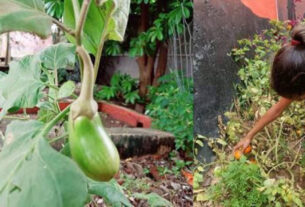Once upon a time, in a village, there was a hardworking farmer. Every morning, he would wake up early and journey to distant springs to fetch clean water. To carry the water, he used two pots, which he tied to a stick and carried on his shoulder. However, one of the pots was broken, while the other was in perfect condition.
Because of this, the farmer could only bring home one and a half pots of water by the time he reached his house. This went on for two years. The intact pot was proud that it could bring all the water home without any loss, ensuring there was never a shortage of water. On the other hand, the broken pot felt ashamed because it could only bring half the water, making the farmer’s hard work seem futile.
One day, the broken pot could no longer bear its shame and said to the farmer, “I’m ashamed of myself and want to apologize to you.” The farmer asked, “What are you ashamed of?” The broken pot replied sadly, “Perhaps you don’t know, but I have a hole, and for the past two years, I’ve only been able to bring half the water. My deficiency is wasting your efforts.”
Upon hearing this, the farmer felt a twinge of sadness. He said, “No need to be sorry. In fact, I want you to notice the beautiful flowers along our path today.” The broken pot did as instructed, and it began to appreciate the vibrant and colorful flowers lining the way. This experience lifted its spirits.
However, by the time they reached home, the broken pot noticed that it had lost half of its water. It became disheartened and apologized again to the farmer. The farmer smiled and said, “My dear, perhaps you didn’t notice that all the flowers were on your side of the path. Not a single flower bloomed on the other side. I’ve always known about your flaw, and I took advantage of it. I planted flower seeds along the road on your side, and you watered them a little every day. Thanks to you, the entire path has blossomed into a beautiful garden.”
The farmer continued, “It’s because of you that I and many others can enjoy these lovely flowers. These blossoms bring happiness and help people forget their sorrows. People offer these flowers at the temple, finding peace in their hearts. They take these beautiful flowers home, making their homes more beautiful. If you weren’t broken, none of this would have been possible. Don’t ever think you’re useless; you are invaluable because you bring joy to countless people.”
In our lives, we often feel worthless and imperfect. However, we must remember that we all have flaws and imperfections. These unique qualities can be turned into blessings if we view them positively. Like the farmer in the story, we should embrace others as they are, focusing on their goodness. In doing so, even a broken pot can become more precious than a perfect one.
FAQ
1. What is the story of the two pots about?
- The story is about a farmer who carries two pots, one intact and one broken, to fetch water. The broken pot feels ashamed for losing water along the way.
2. How does the broken pot feel about its imperfection?
- The broken pot feels ashamed and worthless because it can only carry half the water, unlike the intact pot.
3. What does the farmer ask the broken pot to do one day?
- The farmer asks the broken pot to notice the beautiful flowers along the path while they fetch water.
4. Why does the farmer plant flower seeds on the side of the broken pot?
- The farmer plants flower seeds on the broken pot’s side because he knows it leaks water, and this helps nurture a beautiful garden along the path.
5. What realization does the broken pot have at the end of the story?
- The broken pot realizes that its imperfection contributes to creating beauty and happiness for many people.
6. What is the moral of the story about the two pots?
- The story teaches us that even our imperfections can have a positive impact and bring joy to others.
7. How does the farmer view the broken pot’s flaws?
- The farmer views the broken pot’s flaws as an opportunity to create something beautiful and valuable.
8. What does the story suggest about accepting our own imperfections?
- The story encourages us to accept our imperfections and recognize that they can be turned into blessings.
9. Why is the broken pot considered valuable in the story?
- The broken pot is considered valuable because it contributes to creating a beautiful garden and brings happiness to people.
10. How does the story relate to our own lives and self-esteem? – The story reminds us that we should embrace our imperfections and understand that they can have a positive impact on the world around us.





